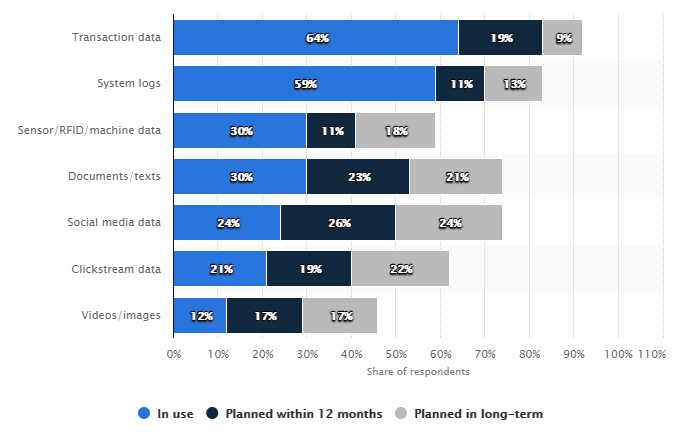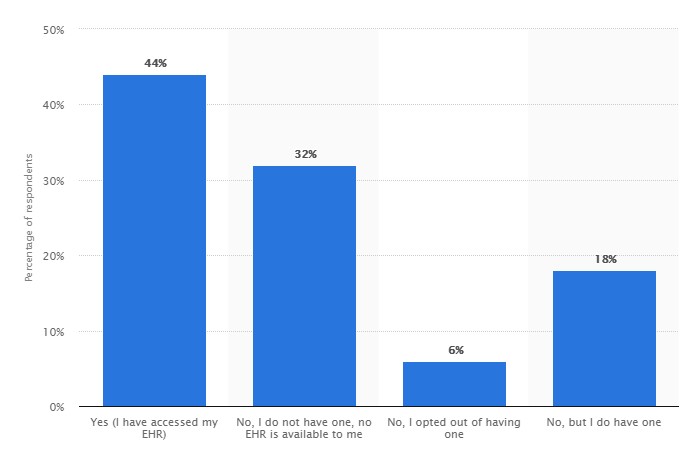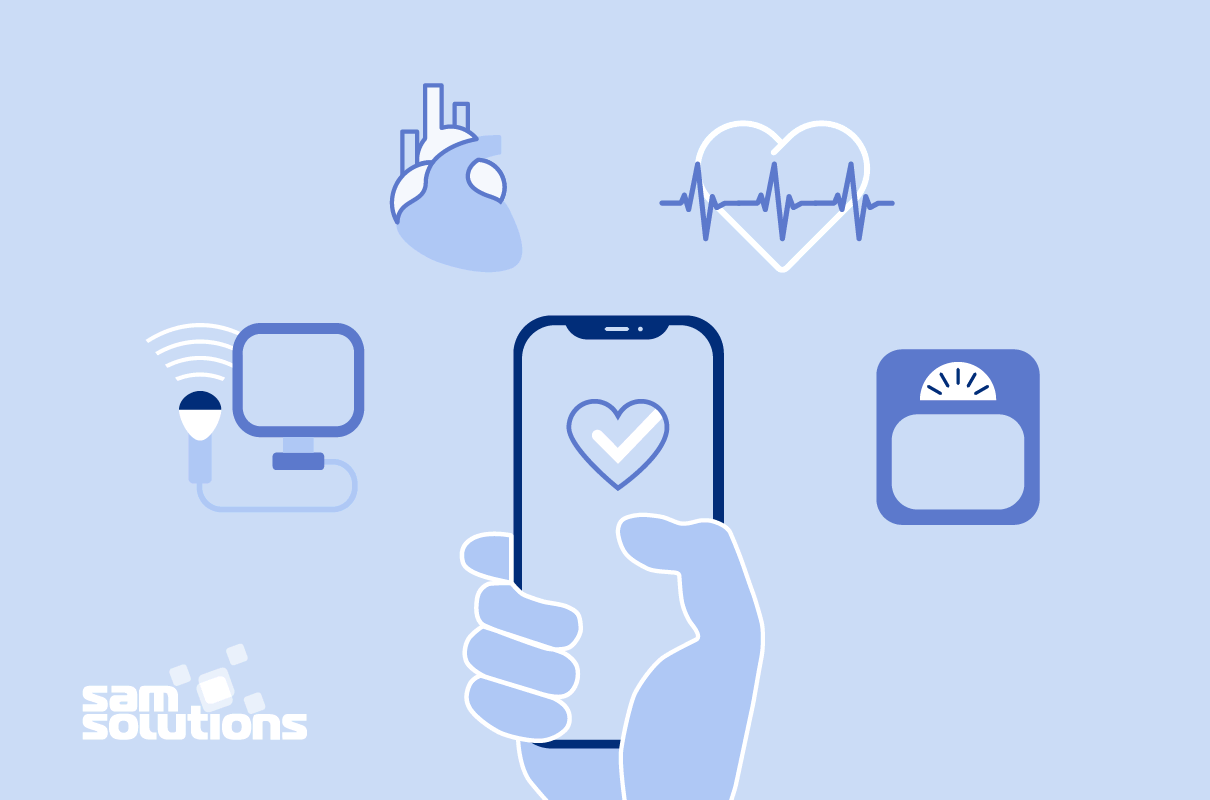Decision-making should be based on facts, regardless of industry. The importance of data collection and its analysis leveraging Big Data technologies has demonstrated that the more accurate the information gathered, the sounder the decisions made, and the better the results that can be achieved. Medicine is that very industry that is greatly influenced and altered by Big Data. Read our article if you want to learn about the importance of data collection in healthcare and the tools that are used to collect information and turn it into business value.
Leverage SaM Solutions’ decades-long expertise in IT to develop high-quality custom software for your business.
Why Is Data Collection Important?
Data collection is the ongoing systematic process of gathering, analyzing and interpreting various types of information from various sources. In general, data collection is done for research purposes in order to understand the full picture of an area of interest and to build a foundation for decision-making.
Data is divided into two types:
- Quantitative — in the form of numbers, e.g. percentages, comparison, etc.
- Qualitative — in the form of words, e.g. description of quality, appearance, etc.
The graph by Statista demonstrates a range of sources used for gaining information: transactions, system logs, sensors, texts, social media, clickstream data, videos and images. As of summer 2016, 64% of respondents were already analyzing transaction data within their organizations, and 28% were planning to introduce this practice, which proves the essential role of collecting data for business.
Sources of big data used by industry professionals worldwide in 2016

Source: Statista
Basically, the purposes of collecting data can be divided into two categories — the development of marketing and prevention strategies.
Marketing Strategies
It is extremely difficult to sell goods and services without knowing your target audience. Marketers in all domains actively use data collection to better understand their customer requirements and improve sales.
The necessary information may include age and gender, contact information, geographical localization, personal preferences and interests. Moreover, testimonials, complaints and suggestions should also be monitored and analyzed.
As a result, marketers can:
- Gain valuable insights and trends
- Build audience profiles
- Organize effective marketing campaigns
- Provide personalized information
- Turn potential customers into loyal clients
- Save money to the promotion of products
- Increase ROI
In digital marketing, special content management systems, such as a Sitecore CMS, are implemented into business processes to collect customer data and deliver personalized content.
Prevention Strategies
Accurate information is a powerful tool not only for commerce but also for industrial and social spheres. The value of timely and precise information is that it can be used to create prevention strategies. Here are some examples.
- In a municipality: online traffic and car accident monitoring in a city in order to map out alternative routes for drivers and prevent them from getting stuck in traffic
- In manufacturing: continuous control of equipment and spare parts in order to repair or replace them before they break down, thus avoiding downtime
- In medicine: monitoring of patient health conditions in order to provide adequate treatment and prevent the deterioration of health
What Is the Impact of Data Collection in Healthcare?
In the healthcare sector, we can find the best examples of how data tracking and analysis change the world for the better. The use of Big Data in medicine is motivated by the necessity to solve both local organizational issues, such as reducing workloads and increasing profits of a medical agency, and the global problems of humanity, such as forecasting epidemics and combating existing diseases more efficiently.
Data collection in healthcare allows health systems to create holistic views of patients, personalize treatments, advance treatment methods, improve communication between doctors and patients, and enhance health outcomes. Let’s take a closer look at some case studies.
Predictive Capabilities of EHR
A personal electronic health record (EHR) is a system that collects information about the patient’s health from a number of sources. An EHR includes test results, clinical observations, diagnoses, current health problems, medications taken by the patient, the procedures he/she underwent, etc.
This type of medical card is able to send notifications to patients about the need to undergo a new test or to ensure compliance with drug prescriptions. This is a vivid example of predictive analytics in healthcare. By using a scope of data from digital medical records, doctors can establish a link between fundamentally different symptoms, give an accurate diagnosis and provide adequate treatment.
The main benefits of an EHR are security and the comprehensiveness of patient information. How popular are these medical documents? According to the survey by Statista dated 2018, 44% of US adult respondents have accessed their EHR, while 18% have not accessed them, but they do have ones. Only 6% of respondents opted out of having an EHR.
Percentage of US adults that have accessed their electronic health records (EHR) as of 2018

Source: Statista
The most effective way to implement data management in healthcare is to create a centralized system of electronic medical records. In the European Union, this system is supposed to become reality by 2020.
Wearable Technology for Diagnosis
The market of wearable electronic devices — gadgets that contain a number of sensors for monitoring various activities and conditions of a human body — is expanding rapidly. Wearables can even transfer gathered information to a personal physician and are thus great data collection tools in healthcare.
Petabytes of information collected from a large number of patients will contribute to the creation of constantly growing databases that will be analyzed by artificial intelligence algorithms in order to identify dependencies between metrics and diseases. Doctors will get a chance to diagnose diseases earlier and recommend the best treatment, or prevent them entirely. This is a vivid example of the importance of accurate data in healthcare.
Wearable devices in combination with analytical systems are inevitable parts of modern resuscitation units, where patients with severe conditions are prone to a sharp decline of health. Predictive analytics help provide the safety of such patients by immediate alerting the medical staff and making sure that critical information is not missed throughout the course of treatment.
Telemedicine
Another example of the importance of data quality in healthcare is the development of telemedicine — the provision of remote clinical services. This term includes both primary diagnostics and consultations, as well as comprehensive monitoring of the patient’s health status, and even surgical assistance.
Telemedicine has been on the medical market for decades, but only today, with the advent of smartphones, wireless portable devices and video conferencing, has it released its full potential.
By eliminating the need for the physical presence of the patient in the clinic, telemedicine reduces the financial costs of medical services and prevents the deterioration of the patient’s health. A qualified consultation may take place at any time and in any place that is convenient for both the patient and the doctor.
Healthcare Data Collection Methods
There is a variety of healthcare data collection methods, from questionnaires and observations to examining documents. Today, the information is mostly gathered with the help of digital channels and numerous applications available in the market.
To choose the appropriate solutions for hospital data collection, a medical organization should take into account:
- Services provided
- The number of doctors and patients supported
- Existing tools and infrastructure
- Budget
The most popular tools for gathering medical information include:
- CRM — integrated customer relationship management systems for generating and handling general information, providing reports and analyzing various issues
- EHR — electronic health record systems for accumulating and analyzing personal patient information and generating deeper insights
- Mobile applications — software that runs on portable devices to connect clinicians and patients, aggregate and access information in various databases
There are also development options: you can either create custom software from the ground up or make use of ready-made solutions that are in abundance on the market. It all depends on your particular situation and expectations.
Our Experience for the Medical Industry
In the age of digital disruption, the creation of reliable software for medical institutions is crucial. SaM Solutions has experience of collaborating with a German provider of software products and services for medical organizations.
The first challenge for our team was to develop an easy-to-use and powerful desktop application Therapy-in-Motion (TiM) to enable comprehensive management of physiotherapy practices. The solution had to simplify doctors’ daily activities such as managing billings, invoices and prescriptions, scheduling treatments, handling patient data and completing medical histories.
The project completion spanned 14 months and included the finalization of usability and feature requirements, design and delivery of the software, rigorous testing and software quality assurance activities. Eventually, the team delivered the app under strict observance of predefined quality metrics and in compliance with the fixed schedule and budget.
The next stage of partnership with this company required the development of a medical mobile application for the module of Therapy-in-Motion desktop software to enhance and facilitate physiatrists’ home examinations. The app was needed to increase doctors’ mobility and eliminate the necessity to take documents with patients’ history to their homes. This allowed the company to reduce document flow and enhanced personal data security.
Currently, the application is fully developed and available for iOS and Android. It enables the input and editing of patient information and synchronizes with the desktop app’s database to store data.
Our team is still engaged in the project, providing support and developing additional features upon the customer’s request.
Final Thoughts
The spectrum of data applications in the field of medicine should systematically expand because data analysis has every chance to change people’s lives for the better. Information technologies make it possible both to identify diseases of an individual and to predict the state of health of entire social groups. Therefore, implementing Big Data into healthcare is the key to developing preventive measures and saving lives. As they say, prevention is even better than a cure.
Do you need a custom medical solution? Contact our specialists to discuss your ideas and to receive an estimate for the project you envision.



















 The Latest 15 Information Technology Trends in 2024
The Latest 15 Information Technology Trends in 2024 Top 10 Embedded Software Development Tools
Top 10 Embedded Software Development Tools IaaS vs. PaaS vs. SaaS: What’s the Difference?
IaaS vs. PaaS vs. SaaS: What’s the Difference? 10 Examples of Predictive Analytics
10 Examples of Predictive Analytics






